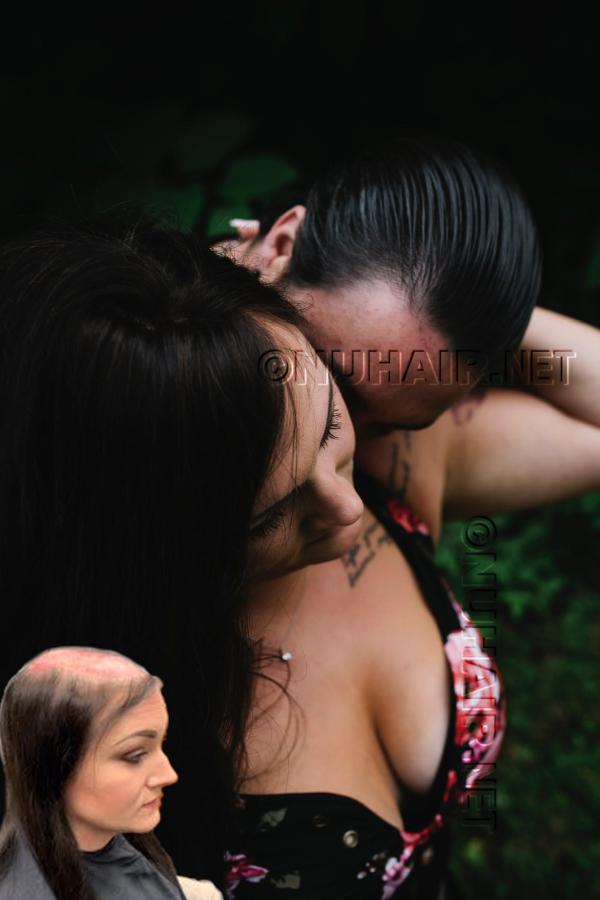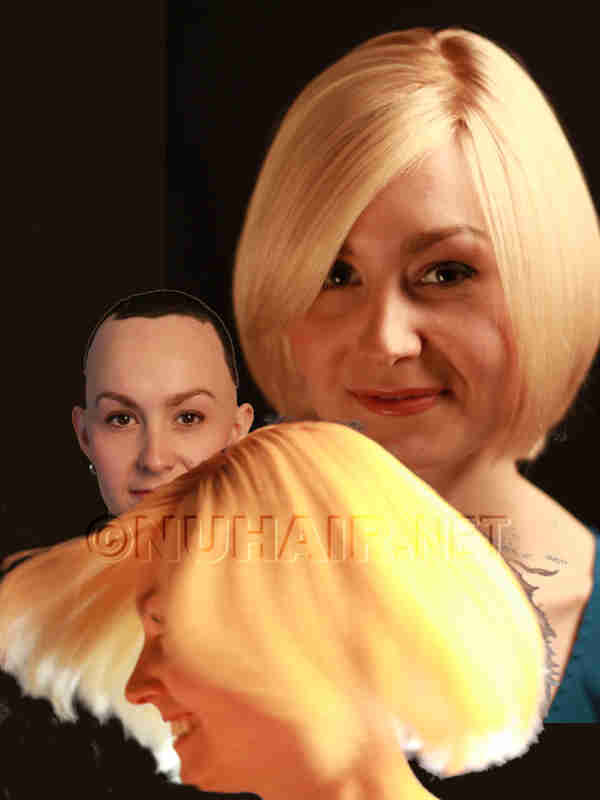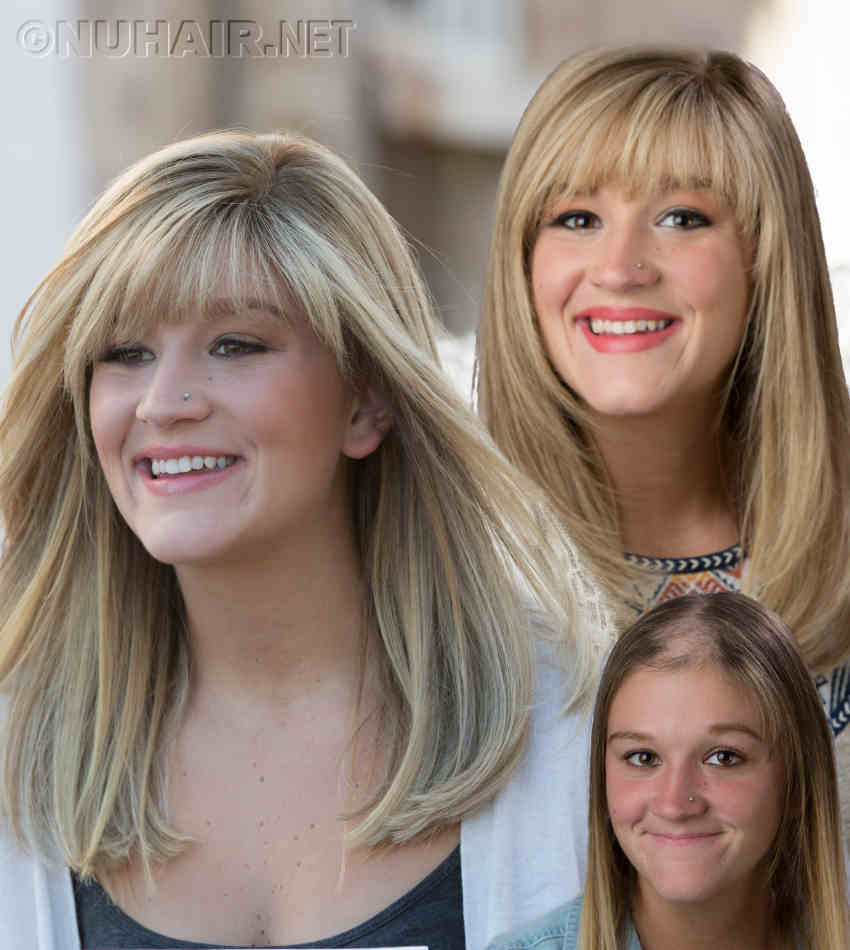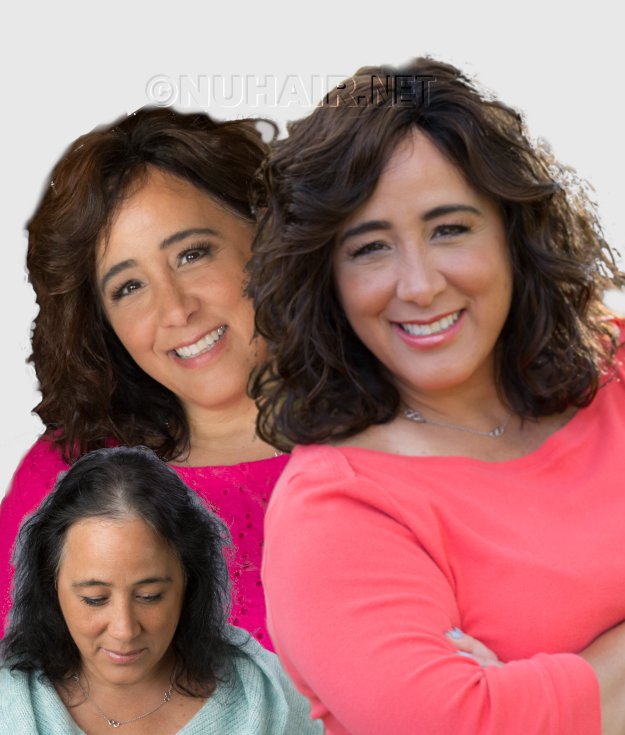Women's Hair Loss
Female Hair Loss, Female Alopecia, 12 Common Causes of Losing Hair & New Treatments.
Women’s hair loss is a medical condition as abnormal hair falls out. US doctors differ in hair loss treatments. How to get your hair back? Treating women’s hair thinning is best to start with laser hair growth therapy, Nu Hair of Dallas, Texas, hair restoration specialist says.

Female Hair loss
Female Alopecia problem
Many women experience female hair loss, female pattern baldness, or various dermatological hair loss conditions in their lifetime.
The number of hair on a healthy scalp is approximately 100,000. And women experiencing hair shedding at the rate of more than 125 hair fall per day is considered a hair loss problem.
According to the American Academy of Dermatology, there is a growing problem with women losing hair:
- It is affecting more than 30 million women in the United States alone.
- Around 40% of women will suffer bald, thinning hair loss symptoms by 50.
- One in every four women in the United States experiences baldness or thinning hair loss at one time or another.
- Androgenic Alopecia is a hereditary female hair loss condition affecting 20 percent of all women.
- Most female hair loss begins in most 40s or 50s at the onset of menopause.
- It can occur as early as the 20s, and it’s in increasing numbers.
Women's Hair Loss Symptoms
The unexpected loss of hair
Female hair loss progress to various degrees of baldness. It typically begins with the scalp along the part, top of your head.
Generally, it than thins over the entire scalp. Hair grows progressively more refined and shorter. Bald spots appear here or there, some with short, broken hair. Total baldness is very rare in women with female pattern hair loss.
To clarify, we use several names for female hair loss:
- Female hair loss
- Women’s Androgenetic Alopecia
- Female pattern baldness

Female Hair Loss Causes
The telogen effluvium stage is when a large percentage of scalp hair is in the “shedding” phase. Women losing hair causes are similar to men’s causes. However, genetics plays a more significant role in hair loss in men. In women, stress, autoimmune, and chemical damage are the primary causes of hair fall.
12 Common causes of female hair loss:
- Androgenetic Alopecia, female pattern baldness, genetics
- Hormonal change
- Thyroid gland abnormalities
- Damaging hair care such as bad hairstyling & over-processed hair
- Severe illness or major surgery
- Anagen effluvium is nonscarring alopecia commonly associated with chemotherapy and radiation.
- Immune problem i.e., Alopecia Areata, Lupus
- Tinea Capitis – fungal infection called scalp ringworm
- Stress-related hair loss, i.e., Trichotillomania
- Fast weight loss
- Vitamin deficiency
- Medication

Pattern Baldness
Female Androgenic Alopecia
In women, female pattern baldness, also called Androgenic Alopecia, is a hereditary female hair loss condition that causes damage to scalp hair, hair thinning, or baldness in about 20 percent of all women.
The most common type of female hair loss but is not a health risk is pattern baldness hereditary hair loss. Pattern hair loss is part of a person’s aging and genetic traits.
Female pattern baldness is most likely affected by male hormones called testosterone. It causes a shut-down of the follicles in response to DHT, a byproduct of testosterone.
“As a result, over time, an excess build-up of DHT in the follicle causes it to begin shrinking, which in turn alters the natural resting and growth phases of the hair,” says Reed, clinical associate professor of dermatology at NYU Medical Center.
Scientists at Bonn University recently found that women who pass a gene conferring high testosterone to their sons also make them more prone to premature baldness.
Causes
- Family genes cause androgenic Alopecia with thinning hair along the top of your head.
- Hormonal change as women age can cause balding.
- Menopause, where women lose estrogen, causes hair to fall.
Hormonal hair thinning
Common conditions
- Pregnancy and the months after labor, post-partum
- Women who go through menopause
- Female hormonal imbalance, at any stage, when estrogen levels decrease and testosterone increases.
- When starting or stopping oral contraceptives, birth control pills
Furthermore, pregnancy and the months after labor, post-partum, are especially vulnerable to women’s hair falling out, as a result of abnormal activity of body hormones. Many women notice hair loss about 3–6 months after having a baby.
During pregnancy, high levels of certain hormones cause the body to keep hair that usually falls out later. Several months later, female hormones return to pre-pregnancy levels. A regular cycle of growth and hair loss returns to normal again.
Medical hair loss causes
Medical & health causes
Some illnesses may lead to thinning hair, including circulatory disorders and arthritis. Others that can cause hair loss are thyroid disease, overactive or underactive thyroid gland, syphilis, and even high fever. In addition, conditions such as lupus or diabetes and fungal scalp infections, such as eczema, may cause hair loss.
Thyroid hair loss
Rapid hair loss is one of the thyroid problem symptoms, with large amounts of hair falling out in the shower or sink. The hair’s texture is dry, coarse, or easily tangled, and an itchy scalp can occur.
A unique symptom of hypothyroidism is hair loss on the eyebrows’ outer edge. Hair regrowth is usual with successful treatment of thyroid disorder. But it takes several months. Also, prolonged or excessive hair loss can be a side effect of thyroid medications.
Alopecia areata hair shedding
Alopecia areata is an autoimmune disease, a nonlife-threatening hair loss condition. The disease causes hair to fall out in clumps as bald spots start to show, which may progress to complete hair loss. However, some lose their hair with bald spots in specific areas and others with thinning hair all over.

Scalp Condition
Dermatological causes
Ringworm of the scalp is a fungal infection affecting hair follicles, resulting in hair loss. In addition, ringworm is contagious and is the most common cause of children losing hair.
Hence, prescribed treatments of lotions or oral drugs may help. Another cause is skin cancer. Also, burns can permanently damage the exposed skin, causing baldness in men and women.
Hairstyling & scarring alopecia
Scarring alopecia occurs in African-American women due to persistent tight hair braiding, weaving, or hair extensions. These cause hair breakage, pulled hair roots, and subsequent scarring. Also, any hairstyle that pulls the hair, like wearing tight pigtails and tight hair rollers, can cause baldness.
Chemical hair treatment
Importantly, improper chemical hair treatments, such as perms and hair straightening, may cause hair falling out due to hair root damage. It may cause hair to fall out in clumps, and it is essential to stop the hair from falling out immediately.
medications & hair shedding
Potential Medication side effect
Prescription drugs, chemo, and radiation therapy cause hair to fall out. Medications, such as blood pressure drugs, Beta Blockers for depression, birth control pills, and menopause hormone therapy, can be the reason. Also, Naproxen Sodium (Nuprin) and others may initiate temporary hair shedding.
Likewise, excessive iron or vitamin A intake is toxic and can cause hair loss.
Sources:

Stress & hair loss
Stress Eye-opening facts
Balding stress
Stress may be a factor in women’s hair loss and can increase the speed of the hair loss process of women who have genetically inherited the trait.
Severe stress, such as losing a loved one, critical illness, or major surgery, may lead to hair falling out. Also, anxiety habits, such as compulsive hair pulling or scalp rubbing, damage hair follicles.
This behavior is known as trichotillomania, affecting 2 percent of the population. Treating the psychological reasons for trichotillomania will reduce this kind of hair loss.
Beauty & hair loss stress
Women losing hair affects their self-image and psychological-emotional pain. Clinical studies of hair loss found depression and anxiety, especially in women with hair loss. Hair plays a significant role in female esthetic beauty, self-esteem, and quality of life.
Society accepts a bald man. But it’s not acceptable for a woman to be bald in public. That is to say, our vision and youth-oriented culture emphasize full-flowing hair as a sexual appeal.
Treating Female Hair Loss
Show & tell balding signs?
When to see a doctor?
You should visit a medical professional if your hair falls out rapidly, hair clumps in a shower, brush, or pillow.
- Dermatologists can diagnose if you are experiencing female pattern hair loss.
- A sudden hair loss can signal an underlying medical condition. Let your family doctor make a complete diagnosis, including your thyroid condition.
- Your gynecologist can monitor your estrogen and progesterone levels, fluctuating during pregnancy and menopause.
- Thinning hair is just one of the many symptoms that may suggest a low or hypothyroid disease, prevalent through mid-life hormonal changes.
Safe Nonsurgical Treatment Options
“If you see an abnormal rate of hair fall, start controlling it with treatments as soon as possible,” says the Dallas hair restoration specialist.
Many doctors start treating Alopecia with medical hair regrowth therapy, such as laser treatments, or hair growth medications Propecia or Rogaine.
Many dermatologists use MEp90 laser as a hair growth treatment. Indeed, MEp90 laser clinical data has proven measurable hair growth results under the FDA supervision trail.
Wigs are the most common hair restoration solution for substantial hair loss. Also, hairpieces are ideal for coverage over a bald area of the scalp with no side effects.
Let's Get Hair
You deserve a full head of hair and all the fun, free of hair loss! Discover easy ways to get your beautiful hair back and tips to optimize your hairstyle.
To schedule your private no-obligation and “no pressure” consultation, use the CONTACT form with any questions or concerns.
By Appointment Only.


